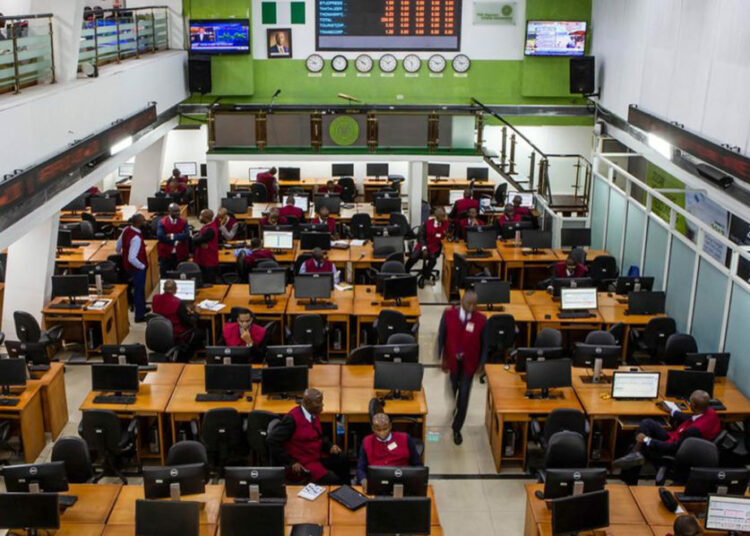Investors’ investment in the Nigerian equities market lost about N3.568 trillion in April 2024 amidst banking recapitalisation exercise and attractive yields on Nigerian Treasury Bills (NTBs).
NTB yield has been rising since the Central Bank of Nigeria (CBN) started its rate hikes in response to the high inflation rate. With the inflation rate at 33.20 per cent as of March 2024, the Central Bank has increased its benchmark monetary policy rate to 24.75 per cent.
Meanwhile, the NGX recorded 18 trading sessions during the month under review, closing lower with the composite NGX All-Share index oscillating, as the benchmark index closing south on 14 trading days, and north in four sessions. The NGX All-Share Index declined by 6.06 per cent to close the month of April at 98,225.63 basis points as against 104,562.06 basis points when it opened trading on April 2, 2024.
While, the overall market capitalisation gained N3.568 trillion to close at N55.553 trillion on April 30, 2024 from N59.121 trillion it opened trading for the month.
The sectoral performance as at April 26, 2024 showed that banking stocks dragged the market the most in the period under review, after losing 25.75 per cent, compared to 6.06 per cent decline recorded by the benchmark NGX All Share Index.
It was followed by the NGX Insurance index, which fell by 5.97 per cent, while NGX Industrial inAdex closed the month lower by 2.83 per cent. NGX Consumer Goods index recorded monthly decline of 2.50 per cent, while NGX Oil & Gas shed 1.69 per cent in April.
Speaking on the NGX Banking Index performance, the managing director of HighCap Securities Limited, David Adonri said, “after the announcement by CBN directing banks to recapitalize, the market started declining, but we cannot see for sure that that policy is behind the decline in the prices of Banks’ stock since that announcement was made.” Adnori noted that investors are trading in the stock market based on sentiment.
The chief operating officer of InvestData Consulting Limited, Mr. Ambrose Omordion said, the monthly decline in the month of April was not unexpected, given the spate of profit taking, and selling sentiments despite being the earnings reporting season.
He added that the corrective wave and pullbacks followed the changing market and economic fundamentals, coupled with mixed reactions to corporate earnings and actions released during the period, saying, “just as higher yields in the fixed income market remain a minus for the stock market, despite the prevailing runaway inflation in the midst of influx of Q1 numbers which are mixed in performance to guide market player’s decision for the rest of the quarter and beyond.”
He noted that, combining these facts with the current situation in the market, we conclude that the market has a mixed possibility of rallying in the month of May, as long-tenored high Treasury bill rates and bond yields remain threats to equity prices.
“The expected investors’ reaction to the first quarter numbers recently released and the qualification dates for dividends will determine how far the market will go in this new month.”
On market outlook, Omordion explained that, “continuation of the oscillating trend of equity prices as a result of repositioning of portfolio along the line of positive numbers and profit taking. Also, the second half of this year will likely be dominated by mixed sentiment.
“Market outlook for May is mixed and dicey, in line with popular saying that traders always ‘sell in May and come back in October’, which may not be applicable in the current trend of our market that has changed.”
He stated further that, “in the Nigerian market, the month of May has closed positively in 17 times over the 26 years. But with the mixed Q1 numbers so far; the oil price oscillating above $87 per barrel in the global market and the CBN intervening in the FX market to create stability.
“The sustained low valuation in the market may trigger high demand for stocks as players realign their portfolios to hedge against the rising inflation. However, there is need to invest wisely, using bids, offers and volume when taking decisions as an investor/trader.”
We’ve got the edge. Get real-time reports, breaking scoops, and exclusive angles delivered straight to your phone. Don’t settle for stale news. Join LEADERSHIP NEWS on WhatsApp for 24/7 updates →
Join Our WhatsApp Channel










